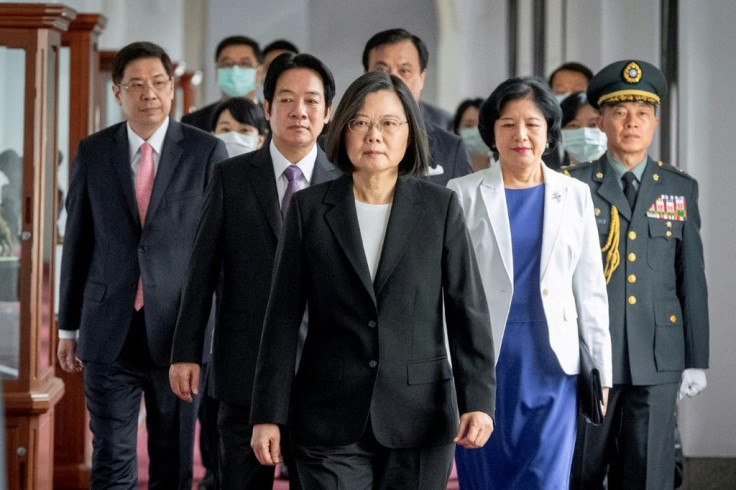Tsai Says China Must 'Coexist' With A Democratic Taiwan
Beijing must find a way to live peacefully alongside a democratic Taiwan that will never accept Chinese rule, President Tsai Ing-wen said Wednesday in an inauguration speech that also celebrated the island's successful fight against the coronavirus.
Voters handed Tsai a second term with a landslide win in January, a vocal rebuke of Beijing's ongoing campaign to isolate the island.
Tsai is loathed by Beijing because she views Taiwan as a de facto sovereign state and not part of a "one China".
Since she first came to office in 2016, China has rebuffed offers of talks and ramped up economic, military and diplomatic pressure on the island.
Beijing views Taiwan as part of its territory and has vowed to seize it by force if necessary.
It envisages a "one country, two systems" model that -- like nearby Hong Kong -- would allow Taiwan to keep some freedoms while submitting to Chinese mainland rule.
But Tsai made clear during her inauguration speech that the concept was a non-starter.
"We will not accept the Beijing authorities' use of 'one country, two systems' to downgrade Taiwan and undermine the cross-strait status quo," she said. "We stand fast by this principle."
Tsai renewed her offer of talks with Beijing and called on President Xi Jinping to work with her to lower tensions.
"Both sides have a duty to find a way to coexist over the long term and prevent the intensification of antagonism and differences," she added.
Taiwan -- officially the Republic of China -- has been ruled separately from the mainland since 1949 after the Nationalists lost a civil war to the Communists and fled to the island to set up a rival government.

For decades, Taiwan's leaders -- and many voters -- saw themselves as the true representatives for all of China, even as the vast majority of nations switched diplomatic recognition to Beijing.
But as the island moved from an autocracy to a democracy from the 1990s, a distinct Taiwanese identity has emerged with many no longer seeking any kind of reunification with China.
That has caused growing alarm in Beijing, which says any formal declaration of independence by Taiwan would cross a red line.
Analysts said Tsai's speech was conciliatory.
"She is telling China that her position has remained the same -- she will not provoke but she rejects any policy that downgrades Taiwan and 'you can talk to me if you are willing'," Fan Shih-ping, a political scientist at National Taiwan Normal University, told AFP.
"She is also assuring the US that she won't be rash and won't become a troublemaker," he added.
J. Michael Cole, a Taipei-based fellow with University of Nottingham's Taiwan Studies Programme, said Tsai's renewed offer of talks with Beijing would likely be spurned again.
"I suspect that it will receive similar treatment this time around, especially given the high levels of positive publicity that Taiwan has received in recent months due to its handling of COVID-19," he told AFP.
Despite its close proximity and economic links with China, Taiwan has managed to contain its own outbreak to 440 cases including seven deaths.
Wednesday's ceremony in Taipei was a deliberately stripped-down affair with crowds of supporters asked to stay away and dignitaries sat in chairs 1.5 metres (five feet) apart.
© Copyright AFP 2024. All rights reserved.





















